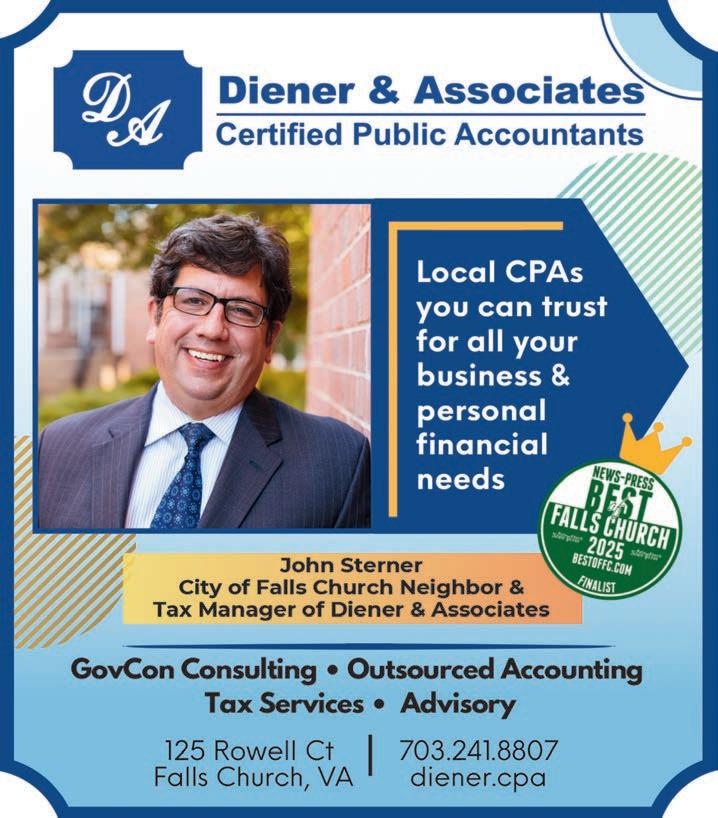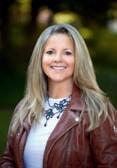

F.C. Council Candidate Forum Is Tonight
First of 4 in Coming Month Ahead of Nov. 4
by Nicholas F. Benton
The first face-to-face candidate forum of this fall’s Falls Church City Council race is slated to be held tonight (Thursday, Sept. 25) at 7 p.m. at the American Legion Post, 400 N. Oak Street, hosted by the Village Preservation and Improvement Society (VPIS) and the Falls Church League of Women Voters (LWV).
There are six candidates running for four of the seven seats on the City Council this fall, with early voting having begun last Friday leading up to Election Day on Nov. 4. State races for governor, lieutenant governor, attorney general and state delegate are also on the ballot. Five local School Board candidates are on the ballot, and the three local “constitutional officer” races on the ballot are all uncontested.
September 25October 1, 2025 PERFORMING AT FALLS CHURCH’S State Theatre last weekend was The Machine, the foremost U.S. cover band for the
In Falls Church, tonight’s forum will feature all six City Council candidates, incumbents Laura Downs, David Snyder and
Continued on Page 3

Floyd. The house was packed for the two-and-a-half hour show. Band members are Tahrah Cohen,
Scott
and Chris
Sen. Warner Sounds Alarm on Intelligence Community
Virginia’s U.S. Senator Mark Warner sounded a loud alarm about the devastating consequences of the Trump administration’s dismantling of U.S. intelligence capabilities in remarks to the George Mason University’s Schar School of Policy and Government in Arlington, Va., last Friday.
Recent moves to remove
scores of top intelligence community professionals on the basis of political loyalty has “undermined the safety of the American people,” he said in an on-stage dialogue with CNN correspondent Jim Sciutto before an auditorium full of Mason students.
“The effort to bend the intelligence community to produce product convenient for the current administration, or to exclude those not loyal enough
to it have spurred our adversaries and competitors,” he said.
“If we don’t have the best people, China, in particular, will be coming for us, making America less safe because of the loss of 75 years of built relationships and soft power.”
He cited the recent removal of 37 intelligence professionals, including senior Russian analysts and uniformed officials and the careless revelation of the identities of over 300
of
covert officials. This reflects, he said, “a pattern of behavior going after analysts who don’t agree with the White House.” America’s allies, he added, have been asking him “what the hell is going on?”
In this environment, he asked, :Would you share classified information with the U.S.?”
In the case of Ukraine, funds dedicated to Ukraine have been
music
Pink
drums, Ryan Ball, guitar and vocals,
Chasolen, keyboard
DeAngelis, bass guitar. This weekend, a Billy Joel cover band performs. (Photo: FCNP)
by Nick Gatz Falls Church News-Press
Falls Church News-Press
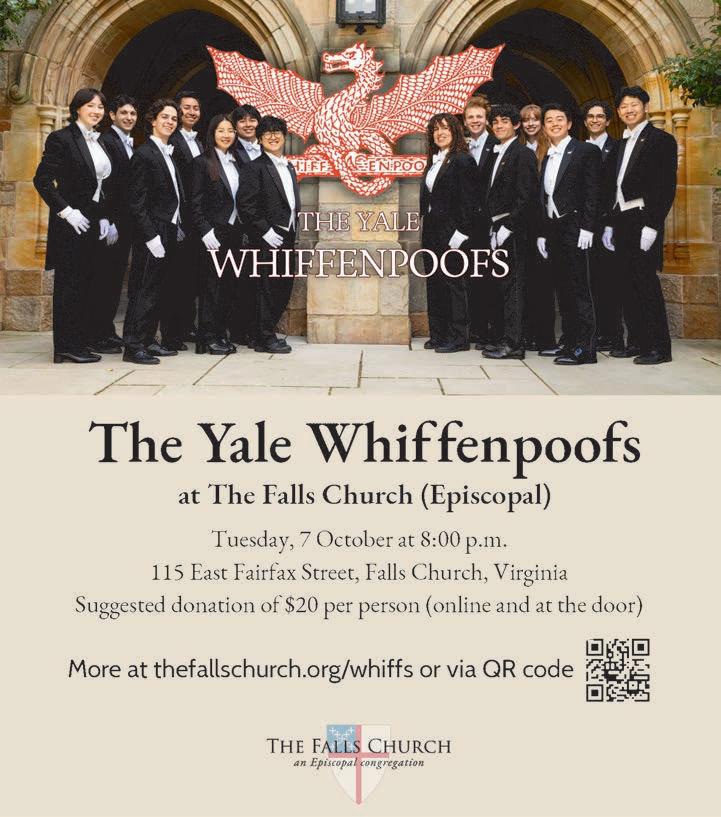
Tuesday, 7 October at 8:00 p.m.
115 East Fairfax Street, Falls Church, Virginia
Suggested donation of $20 per person (online and at the door)



Falls Church Business News & Notes
Welcome An Honor Flight Tonight
Hilton Garden Inn Falls Church hosts the Honor Flight New Mexico tonight and invites the community to give them an enthusiastic welcome. Veterans are expected to arrive at approximately 5:30 p.m. Individuals and groups are welcome to celebrate them along with the Falls Church Sheriff’s Department, and the Saint James Catholic School Girl Scout team.
West Falls Fall Festival
The Commons at West Falls is celebrating its official opening of the West Falls Community at Leesburg Pike and Haycock Road by hosting its first Fall Festival on Sunday, September 28, 11:00 a.m. – 3:00 p.m. Enjoy apple cider, art activities, kids’ games and entertainment, photo ops, and restaurant samples from Mason’s Lobster Rolls and SeoulSpice and more.
Unplugged Open House
Recovery Unplugged is hosting an Open House to celebrate its grand opening on Tuesday, September 30, 1:00 – 4:00 p.m. They have locations across the country, and will have live music, food, tours, sound bath demonstrations, and valet parking. The official ribbon cutting will be held at 2:30 p.m. RSVPs are requested for planning purposes: https://www.eventbrite.com/e/recovery-unplugged-dc-metro-open-housetickets-1607237272949?aff=ebdsoporgprofile
Capital Comedy & Talent Show
A showcase of local comedians and performers will be celebrating community, creativity, and the humanities. Co-hosted by Robert Sherretta, FCCTV and Rose Hong, Executive Director of Global Dragon TV and Global Humanities Foundation the show will be held on Tuesday, September 30, 6:00 – 8:00 p.m. in the FCCTV Studio, 2nd Floor, at 121 Mustang Alley. Use the link to secure your reservation. https://www.eventbrite.com/e/capital-comedy-talent-show-tickets1657951069279?aff=oddtdtcreator
VIGEO Celebrates Certification
VIGEO Health announced that it is now officially CHAP Accredited & Medicare Certified. VIGEO Health is a local employee-owned healthcare group with three solutions that work together: VIGEO Home Health, VIGEO Physical Therapy, and VIGEO Companion. Many of the services are offered across much of Northern Virginia and will continue to expand its certifications and reach.
Small Business Grant
Faire.com is offering a small business grant for new retail stores. Those who have opened a retail store in 2024 or soon to open may qualify to win a $5,000 grant in Faire merchandise to kickstart the dream of business ownership. Applications close on September 30. Learn more at https://www.faire.com/small-business-grant.
“Best
of Summer” Shows
This is the last week of The Best of Summer at Paragon. Tomorrow two shows will return, “Sinners” and “Jurassic World: Rebirth” till the end of the month. Tickets are $8.
Business News & Notes is compiled by Elise Neil Bengtson, Executive Director of the Greater Falls Church Chamber of Commerce. She may be emailed at elise@fallschurchchamber.org.
First F.C. Council Candidate Forum Set Tonight at Am. Legion
Snyder and Marybeth Connelly, and first-time candidates Arthur Agin, Brian Pendleton and James Thompson Jr.
Tonight’s will be the first of four allCouncil candidate forums this season, the other three set for October 16, 21 and 22 hosted by different civic groups. The F.C. LWV will publish a Voter Guide in next week’s News-Press that will include candidate responses to a range of issues. City Council and School board responses to questions from the Falls Church Climate Action Network are now accessible through that group’s website and the NewsPress last week endorsed the three Council incumbents and Agin.
This voting season was kicked off by a heavily-attended annual Falls Church City Democratic Committee potluck held at the F.C. Community Center last Sunday. The homey ambiance of the event, with a plentiful array of home-cooked potluck choices a welcome substitute for the “rubber chicken” fare at countless other political events, was noted by keynote speaker U.S. Rep. Don Beyer, Falls Church’s Native Son, as was the robust acapella singing of the national anthem that kicked off the night.
A contingent of Young Democrats from the Meridian High School Democratic Club
filled a table and youth was in force making a couple of the speaker introductions, as well.
The event was highlighted right off the bat by uncommonly heartfelt remarks from Mayor Letty Hardi. She said the potluck is “a great metaphor for our growing city: the more people come, the better it gets. The more diversity in choices of food. The more fun our conversations are. The fabric of our community truly becomes richer with every new dish and neighbor.”
She then said, “We’re coming together tonight not just for food and metaphors, but for something more urgent: to recommit ourselves to protecting and strengthening our democracy. We know that voting is the foundation of that democracy and all eyes are on Virginia, not only in the U.S., but across the world, in November.
“Voting is the most basic, powerful tool we have as citizens. And yet, we’ve seen real threats, disinformation, erosion of civil liberties, masked men kidnapping people on the street because of the color of their skin, attacks on freedom of speech, and even violence—that are meant to weaken faith in our system.
“For me, this work is deeply personal. I’m the daughter of immigrants who came here in search of opportunity and a better future for their kids. As a first-generation American who was naturalized as a teen-

ager, I grew up understanding that the right to vote is not something to take for granted—it’s something people around the world fight for.
“Voting has always been honoring my family’s sacrifices, fulfilling their hopes, and electing people who live and promote all the ideals and policies that make my family’s story possible. And that is still what shapes my own work on the City Council.
“Before my dad died this summer, he reminded me how proud he was to see his children thrive in this country and how he leaves the world with no regrets because of what became possible here.
“As someone whose first language wasn’t English and therefore spent kindergarten and first grade in ESL classes, whose first home in the U.S. was an accessory dwelling in San Francisco (that wouldn’t even be legal here in Falls Church up until last spring), who was the latch key kid who became the first in my family to go to college, thanks to Pell grants, scholarships, and some student loans, my American story is now under threat.”
She was followed by Beyer, who focused his remarks on three themes, community, healing and hope and change. He recounted the founding and growth of his father’s Volvo dealership in Falls Church, which started with 12 employees in 1973.
“Falls Church has been a great blessing,” he said, “With generations of great governance here.”
He noted that Mayor Hardi joined him in an event earlier that weekend at the Paragon Theater in F.C. that helped over 200 displaced federal workers find resources to deal with having been laid off by Trump.
He said it is critical to fight back against Trump’s moves, from globally to locally. “We do it by making our communities as strong as possible and by taking care of our neighbors.
“Healing comes by overcoming our divisions in the context of less-certain lives that are fueled by ‘conflict entrepreneurs,’” he said. “We can’t heal by hating the ‘other.’” On hope and change, he cited the Barbara Tuchman historical account of the Black Plague-riddled 13th century in her “Distant Mirror” work. As bad as that century was, with the 100 Years War and disease and average life expectancy of 19 or 20, it gave way to the end of feudalism and the unleashing of the Renaissance.
“Look for the good in everything,” he advised.
Other stirring remarks were delivered by State Sen. Saddam Salim and State Del. Marcus Simon, who was the only person present actually on the ballot this November in a contested race.

Warner Criticizes Trump Intelligence Cuts in GMU Talk
put on hold, with an on again, off again approach frustrating the Ukrainians. Trump’s claim that Russia’s war with Ukraine “doesn’t matter to the U.S.” reflects an attitude that “hasn’t read history” with nine months and no deal on a resolution. “Do you think Putin will be satisfied with Ukraine only? He’s going for a reconstitution of the old Soviet Union. We have to deal with the reality of Putin’s ambitions.”
But the threat he outlined is not only foreign. He cited the removal of key FBI agents


involved in the investigation of the January 6 insurrection and the impact of a “decimated intelligence community” on the upcoming U.S. elections. “The mechanics of election security in the U.S. is being dismantled. These are not normal times.”
Election interference by Russian, Chinese and Iranian actors pose threats to the U.S. that have not gone down even as the U.S.’s guard rails go down, he said. With advances in AI making it harder and harder to determine what is true or not, “interference in our elections is a lot cheaper than fighting a war.”
“If this doesn’t worry you, I don’t know what will,: he said. The effects of tariffs on the economy, of the loss of “soft power” through intelligence capabilities and massive cuts and increased costs of health care immediately ahead for everyone is a devastating combination and when Sciutto asked if he sees any “Profiles in Courage” out there, Warner said, “I don’t see it. I am hearing stories of threats to family members, especially to daughters.”
The solution is not to lay low. “If we don’t stand up, we’ll get what we deserve. If we don’t fight now, this will be a very different country, and it will take a long time to recover. Millions of medicines to Africa are now being allowed to rot. We have a long way to go against how China is using AI against us. There is now becoming a lost generation of emerging intelligence professionals who can’t find jobs. We
must refuse to bend a knee.”
Later that day, Warner responded to a meltdown by Trump during which he turned his wrath against both Warner and fellow Virginia Senator Tim Kaine.
Trump posted online, “Two bad guys! Bad senators! They do a terrible job for the people of Virginia!”
Warner replied in a statement, “Now we may be biased, but we tend to disagree with Trump’s assessment of our work. We’ve both served as Governor of Virginia and as U.S.
Senator to this great Commonwealth, and we love the people of Virginia. We’ve fought for our state to be a great place to live, do business, and raise a family — and it is!
“We’ve been so proud to work with each other, with our strong congressional delegation from across Virginia, and with our great partners in Richmond to get things done for folks — expanding broadband access, securing funds for hospitals and other job centers, lowering costs, making communities safer, strengthening our schools, and so much more.”


U.S. SENATOR MARK WARNER (right) delivered worrisome remarks on the impact of the Trump administration’s assault on the U.S intelligence community at George Mason University’s Arlington campus last Friday. CNN’s Jim Sciutto (left) moderated. (Photo: FCNP)
Please
Don’t
Eat
Your Children, Part 1
Nicholas F. Benton

In his famous short essay, “A Modest Proposal: For Preventing the Children of Poor People in Ireland From Being a Burden to Their Parents or Country and for Making Them Beneficial to the Public,” author and Anglican priest Jonathan Swift (1667-1745) uses cutting satire to suggest that cannibalism of the young might help solve a battery of social ills.
As we examine our broken society today, it seems to me that reflecting on Swift’s social critique can be quite useful.
Now we face a nation filled with anger and division and there is little to suggest any real solutions other than insisting people “don’t do that!” We can start out with the observation that young children, left to their own, are neither hateful nor cruel. How do they get that way later on in their lives? What drives them toward such emotional states and behaviors?
It is not a problem only for the margins of society, for the extreme misfits or troubled. It is defining the very center of our culture today. Our divisions are not the cause, but the result of something, and nobody is saying what that is.
Swift doesn’t say what it is in his biting little essay. But it is implied by a context of a lack of bounty, or poverty, on the one hand, and an approach to it characterized by obscenely cruel indifference, on the other.
He coined the phrase “useless eaters” in defining his radical solution. In Hitler’s Germany, that term resonated through the death camps and some in our present situation are daring to evoke it again as the current administration pushes radical cuts in Medicaid funding.
But while that refers to the old and infirm, mostly, it is the young we are talking about here. The problem is that our society is structured to devour our young and as they begin to find that out, they rebel.
Not in all cases is this the
practice, of course. Where there is little or no lack, things are different. We nurture our young, as we should, and we love them. Lucky is the child who is born to parents who are of means, and in a community where nurture is possible and valued. But even such children are ultimately not immune from facing a destiny of pale conformity battered by tightly delimited social expectations and debt slavery. If they have enough ambition, education and doors opened for them, some can run the gauntlet with relative effectiveness.
Otherwise, our young are raised to die on battlefields, or to struggle in myriad other painful social conflicts aimed at advancing the world of their elders.
In the Bible, there is a great admonition against this process that comes at the very precondition for the tradition it represents that begins with Abraham.
It is in the book of Genesis at the beginning of the Biblical story when, as that story goes, God commanded Abraham to kill his son, Isaac, as a sacrifice. As Abraham is about to obey, God steps in and says no. The entire subsequent eons-long struggle to realize Abraham’s commission by God to make a great nation that would be a light to the world would have been cut short right then if Abraham had slain his own son.
The message is that all of the Abrahamic traditions, Judaism, Islam and Christianity, owe their source, and in fact are rooted, in God’s command to reject the sacrifice of children to the whims of their elders.
The last thousands of years can be best defined in these terms, where nurture is pitted against exploitation of our young with, at best, vastly mixed results.
Scenes like that at the opening of “All Quiet on the Western Front,” the World War I novel and film where a teacher rallies a classroom full of boys to enlist in the war, is bone chilling.
Or, the lyric in Pink Floyd’s iconic song, Comfortably Numb, “When I was a child, I caught a fleeting glimpse out of the corner of my eye. I turned to look but it was gone. I cannot put my finger on it now. The child is grown, the dream is gone.”
COMMENT

A Penny for Your Thoughts
By Penny Gross Former Fairfax County Supervisor
Every so often, it’s important to get out of the “bubbles” we live in and explore “bubbles” in other parts of the country. Last week, I attended my college reunion at the University of Oregon and got a measure of how folks on the far side of this nation view both the national and local mood. As a native Oregonian, I grew up in small-town Eugene where Game Day was not the spectacle it is today. The entire population of my hometown could fit in Autzen Stadium today, with lots of room to spare. The reunion included the “Civil War” football game between Oregon and its archrival Oregon State and my beloved Ducks defeated the Beavers 41 – 7. In addition to all the usual football hoopla, I was surprised to see an enormous American flag, probably 20 x 50 feet, move hand-over-head around the entire stadium beginning at half-time. On a beautiful sunny autumn day, there was nothing more traditional than football, flags, and fans that all could share and enjoy. Oregon is a blue state and was known as a counter-culture locale even when I was in college, but time can change perspectives so I wondered how my classmates viewed today’s political mood. Almost to a person, they were horrified about
the Trump Administration’s actions and wondered how our democracy would fare in the end. The one outlier was a classmate’s wife who was pleased about abortion restrictions and supported bringing more religious concepts into government. We had a good conversation about many topics; our time together ended amicably but I doubt any viewpoint was swayed.
Localities share many attributes in common, albeit at a different scale. In Eugene, almost every street has a designated bike lane. Traffic calming is handled by speed humps, roundabouts, planted median breaks, a 25-mph speed limit, and shorttimed traffic lights. Pedestrians of all ages are downtown, on campus, and on neighborhood sidewalks.
The city retrofitted an old downtown bus garage into a well-used farmer’s market site that hosts Tuesday and Saturday markets, plus one Thursday night market each summer month.
Some stalls are under tents, but the indoor stalls are well-protected from the ubiquitous Oregon “mist.”
As Fairfax County slowly ramps up efforts for murals in public spaces, Eugene initiated an effort to create at least 20 murals – the last count was 60-plus -- in advance of the IAAF World Track and Field
City of Falls Church
Crime Report
Week of Sep 15 - 21, 2025
Shoplifting, W Broad St, Sep 16, 10:44 a.m., two unknown suspects stole merchandise. The first suspect is described as a Hispanic female, approximately 30–40 years of age, with long black hair, wearing a white long sleeve shirt, black pants and pink crocs. The second suspect is described as a Hispanic female, approximately 25–30 years of age, with long black hair, wearing a white long sleeve shirt, black pants and light blue crocs. Destruction of Property, Hillwood Ave, Sep 16, 12:14 p.m., an unknown suspect broke windows on the victim’s home.
Public Intoxication, Wilson Blvd, Sep 16, 5:07 p.m., a white male, 26, of Alexandria, was arrested for Public Intoxication.
Failure to Appear, Park Ave, Sep 18, 10:36 a.m., a black male, 28, of Washington, D.C., was arrested for Failure to Appear.
Larceny from Building, W Broad St, Sep 18, between 6:00 p.m. and 7:00 p.m., an unknown suspect stole the victim’s unsecured black GT73 Riding Time Electric Bicycle.
Championships in 2022 (Eugene is TrackTown USA; Hayward Field is the premiere track and field venue in the world, mostly courtesy of Nike founder Phil Knight, an Oregon alum). Murals might cover the entire side of a building, or a small traffic box. I liked the vertical murals that soar to the top of a building or parking garage but may only be five feet wide. Themes celebrate the indigenous peoples of Oregon and the Pacific Northwest, birds and flowers, botanicals, and the occasional athlete. Local rules and regulations can make murals and public art difficult to install, but Eugene’s experience might be a lesson to the bureaucracy that can stifle creative expression and community discussions. Fairfax County has plenty of opportunities for murals and public art, something that the Mason District Arts Committee is spearheading locally (more on that in a future column). During my trip, a resident noted that the D.C. area is very expensive compared to Oregon. That’s true to a certain extent –at CVS in Eugene I paid $6.49 for a cold remedy that costs $8.79 here, and Oregon has no sales tax – but a gallon of regular gas was $4.24 in Eugene ($4.54 near the Portland airport where I returned my rental car) vs. $2.89 in Annandale. House prices are lower in Oregon, but so are wages and salaries. The high cost of housing is affecting Oregon localities, which are feeling the same pinch we have in Northern Virginia.



PAGE 6 | SEPTEMBER 25 - OCTOBER 1, 2025

Since 1991, an award-winning LGBT-owned general Interest community newspaper.
Vol. XXXV, No. 33
SEPTEMBER 25OCTOBER 1, 2025
• City of Falls Church
‘Business of the Year’ 1991 & 2001 • • Member, Virginia Press Association •
Nicholas F. Benton Owner & Editor-In-Chief nfbenton@fcnp.com
Nick Gatz Managing Editor ngatz@fcnp.com
Sue Johnson Advertising Sales sjohnson@fcnp.com
Ted White Copy Editor Circulation delivery@fcnp.com
To Contact the News-Press
phone: 703-532-3267
email: fcnp@fcnp.com
display advertising sjohnson@fcnp.com
703-587-1282
classified & Legal ads classads@fcnp.com
letters to the editor letters@fcnp.com News & Notes newsandnotes@fcnp.com
Obituaries obits@fcnp.com subscriptions distribution & delivery delivery@fcnp.com
www fcnp com
The News-Press is certified by the Commonwealth of Virginia to publish official legal notices including probate, abc notices, small and foreign estates. We will provide the appropriate paperwork. A comprehensive book on the 36 year history of the News-Press, “The Life and Times of the Falls Church News-Press”: by Charlie Clark (History Press, 2023), can be purchased at local bookstores or online. The Falls Church News-Press is published weekly on Thursdays and is distributed free of charge throughout the City of Falls Church and the Greater Falls Church area to over 140 locations. Offices are at 105 N. Virginia Ave., #310, Falls Church, VA 22046. Reproduction of this publication in whole or part is prohibited except with the written permission of the publisher. ©2025 Benton Communications Inc. The News-Press is printed on recycled paper. A searchable archive of all issues of the Falls Church News-Press since 1991 can be found at bit.ly/44kt6Sc.
EDITORIAL
We’ll Need the Gordons Triangle
The gathering earlier this month of the Falls Church City Council, Planning Commission and Economic Development Authority (EDA), folks all crammed into a F.C. City Hall meeting room, spent an hour and a half discussing how the 22-acre Gordons Road Triangle area at the west end of the City, south of Route 7, might be, to a greater or lesser degree, redeveloped.
It is not a matter that is expected to be acted on seriously anytime real soon. However, there was one component of that conversation sorely missing, and because of that, the entire exercise was quite inadequate. That is, the matter of the overarching Recession (with a capital ‘R’), and possibly worse, facing the region thanks to the wanton cancellation of federal programs by the Trump administration.
This week’s Washington Post story about the impact of 15,000 jobs lost in Maryland quotes Mark Zandi, the chief economist at Moody’s, saying that “it is safe to say the Maryland economy is in a full scale recession” as a result.
A similar story could be written about Virginia. According to the Weldon Cooper Center at the University of Virginia, over 11,000 federal jobs in Virginia have already been affected and another 10,000 are at risk, with broad impacts also on professional, scientific and technical jobs that rely on federal work. Nobody knows right now how bad it will get, but it will be very bad.
So, in this context, the question must become for the City of Falls Church what kind of revenue is required to keep the City going, without drastic cuts and tax increases, in the face of this grim reality? That question was not entertained by anyone at the Sept. 15 meeting.
The 22 acres around Gordons Road is the City’s last best shot at doing something big that would be especially important in the current situation. Twenty-two acres is a lot of land, twice the size of the 10 acres that the City so deftly orchestrated to be morphed into the grand West End project that has arisen on land that was not that long ago used for its high school.
The triangle includes about an equal portion of land actually owned by the City, on the one hand, and the Beyer Family, on the other. The Beyers sold their auto dealership, but continue to own the land on which it sits and more. So, while the Beyers have submitted preliminary plans to Fairfax County for the portion of their parcel that spills over into the county, surely they would be open to talks with City of F.C. people on how to proceed for the best yield.
Then there is the land across the street where the Giant now sits, owned by Federal Realty. What if it came into those talks, and something with a floor-area-ratio (FAR) equal or greater than the West End, was cooked up? We’re going to need it.
Platform
1. Keep the news clean and fair.
2. Play no favorites, never mix business and editorial policy.
3. Do not let the news columns reflect editorial content.
4. Publish the news that is public property without fear or favor of friend or foe.
5. Accept no charity and ask no favors.
6. Give ‘value received’ for every dollar you take in.
7. Make the paper show a profit if you can, but above all keep it clean, fearless and fair.

DON’T
LET
THIEVES
TAKE YOUR CAR FOR A SPIN
Beat the thieves by locking up, taking your keys, and hiding your valuables. Get more auto theft prevention tips and report suspicious activity at HEATreward.com

Art Once Changed History — Will This Generation
By Falls Church News-Press
Art has always been a mirror of society. It absorbs the anxieties, the aspirations, the unrest, and the triumphs of its time, and then reflects them back with a clarity that words alone cannot achieve. For nearly a century, art has not only documented history but driven it. It gave voice to movements, rallied millions, and made governments nervous. And yet, today, at a moment of deep uncertainty, the canvas feels quieter, more commercial, more controlled.
In the 1930s and 1940s, art was about survival and solidarity. Picasso’s Guernica seared the horror of fascism into the conscience of the world, while American painters like Grant Wood lifted up the image of working people as national strength. World War II brought propaganda posters, photography, and mural projects that reminded citizens of sacrifice and unity. In those years, art was never just decoration. It was sustenance, motivation, and at times, a weapon against despair. The U.S. government even funded creativity: through the Works Progress Administration, more than 200,000 works of art were commissioned
during the Depression to employ artists and inspire resilience.
In the 1960s, art was protest. It was Andy Warhol challenging consumer culture, Judy Chicago demanding women’s voices be heard, and civil rights marchers carrying hand-painted signs that are still etched into the story of American democracy. The visual language of that era—murals, posters, banners— became permanent symbols of resistance. Creativity was not passive; it was a force that bent the arc of history.
By the 1970s, disillusionment spilled onto canvases and city walls. Graffiti on subway cars became the voice of marginalized kids in New York — an act of defiance in a city that had written them off. In the 1980s, Basquiat, Haring, and the AIDS Quilt turned art into urgency, protest, and grief. By the time the Quilt was first displayed in 1987, it covered a football field with nearly 2,000 panels memorializing those lost to HIV/AIDS. In the 1990s, street artists like Shepard Fairey reminded the world that walls could still speak. His Obey Giant stickers mocked power, and his HOPE poster for Barack Obama in 2008 became
one of the last pieces of truly unifying protest art — distributed to more than 300,000 supporters and becoming an instant campaign icon.
But where is that energy today? Where are the murals, the posters, the images that refuse to let us look away? Shepard Fairey is still working, but the culture has moved elsewhere, swallowed by algorithms and branding. Protest art now lives in flashes: a mural after George Floyd’s murder, a projection on a courthouse wall, a slogan painted on cardboard that may never reach beyond one march. The voices that once roared through galleries, city streets, and public squares are now scattered across platforms, each echoing in silos.
It is not for lack of crises. The climate is breaking. Authoritarianism is rising. Inequality is widening. Mental health, democracy, even truth itself, feel under attack. And yet, too often, the culture around us has been tempered into easy consumption. Festivals are brand activations. Galleries worry about donors more than danger. Social media algorithms reward what is quick and catchy, not what is lasting or uncomfortable. A protest mural might live for decades
on a wall, but a viral image can vanish in hours. The attention economy has made art disposable, and with it, we risk losing the power of art to endure, to needle, to provoke.
Even in smaller communities, the tension is visible. Local festivals or public art projects often emphasize decoration rather than disruption. Sponsors, grants, and institutions want art that is safe, photogenic, and easy to share — not the kind that challenges the very systems that fund it. Meanwhile, the numbers show art’s reach: the nonprofit arts industry generates $151 billion in annual economic activity in the U.S. and supports 4.6 million jobs, according to Americans for the Arts. Yet much of that impact is measured in dollars, not in disruption. But when genuine protest art appears — a mural in Minneapolis, a projection on a courthouse, a theater performance that refuses to play safe — it proves the power is still there, waiting to be tapped.
That cannot be where this story ends. History tells us silence does not last forever. Every generation has found its voice in paint, in sculpture, in images that refused to be erased. But the truth is, it will not happen
unless young people seize the tools in front of them. Shepard Fairey was a college kid pasting stickers on stop signs when his movement began. Basquiat was painting on walls before he ever sold a canvas. The civil rights marchers were ordinary people with cardboard and paint. Protest art has never waited for permission — and it shouldn’t start now.
This generation has more power in its pocket than any before it.
A mural on a city wall, a digital image shared across continents, a poster uploaded to social media, a graphic turned viral in hours — all can still carry the same force if wielded with courage and conviction. A teenager with an iPhone has the same reach today that once required a printing press or gallery opening. The question is whether young voices will use those tools to say something bigger than themselves, or let them be swallowed into distraction.
Art speaks the loudest when power tries hardest to silence it. The world is waiting for the next cry, the next image, the bold stroke of paint that dares to say enough. It is time for a new generation to pick up the tools and remind us all.

Whatever Happened to Protest Songs? Music and Resistance
For most of the 20th century, music was inseparable from the cultural movements that shook the world. Social upheaval, wars abroad, and civil rights struggles at home all carried a soundtrack that not only reflected the mood of the moment but also amplified it. Today, even in an era of political polarization, climate anxiety, and global unrest, the soundscape feels quieter, more controlled, and more commercialized. It begs the question: where did the protest songs go?
In the 1960s, music and protest were practically one and the same. Bob Dylan’s “Blowin’ in the Wind” and Sam Cooke’s “A Change Is Gonna Come” voiced the Civil Rights Movement. Joan Baez and Country Joe & The Fish sang against the Vietnam War at Woodstock, turning the festival into a cultural touchstone for an entire generation of dissenters. Aretha Franklin’s demand for “Respect” doubled as a rallying cry for both women’s liberation and Black empowerment. Even earlier, during the
1940s, jazz and swing were tied to wartime morale and unity, giving soldiers and families a sense of shared identity. In the 1970s, Marvin Gaye’s “What’s Going On” addressed police brutality and environmental decline, while punk rock bands from the Sex Pistols to The Clash turned antiestablishment fury into threechord rebellion. Each moment of cultural crisis or transformation came with its sound, raw, fearless, and impossible to ignore.
By the 1980s, music was entering a new era. MTV launched in 1981, making the image of the artist just as important as the message of the song. While hip-hop emerged in the Bronx as a form of social protest, with Grandmaster Flash’s “The Message” describing urban poverty with unflinching honesty, much of mainstream radio turned toward polished pop and consumer-driven stardom. The 1990s kept some of that edge alive. Rage Against the Machine screamed against government surveillance and corporate greed. Tupac Shakur rapped about systemic injustice, police violence, and inequality. But even then,
the consolidation of radio stations under corporate ownership tightened playlists and narrowed the room for songs that didn’t fit neatly into commercially viable boxes.
By the 2000s, the music industry’s very structure was changing. Napster, iTunes, and later Spotify upended how people consumed music. On one hand, this democratized access; on the other, it shifted control away from DJs and protest stages toward algorithms and corporate licensing. The music that rose to the top was increasingly what could fit a global playlist, not necessarily what could spark a movement.
In the 2020s, there is no shortage of global crises to sing about: racial injustice, climate change, authoritarian politics, income inequality. Yet much of today’s chart-topping music is more about personal identity than collective protest. Songs trend on TikTok because they are catchy in 15-second clips, not because they rally thousands to march on Washington. That is not to say protest music has vanished entirely. Kendrick Lamar’s “To

Pimp a Butterfly” and Childish Gambino’s “This Is America” directly challenge systemic racism and violence. Artists like H.E.R. (“I Can’t Breathe”) and Run the Jewels continue to voice anger and demand change. But these songs are exceptions, not the cultural center. They live in playlists next to love ballads and dance tracks, their revolutionary potential diluted by the endless scroll of the algorithm.
Meanwhile, the live music experience, once the heartbeat of protest, has been transformed into tightly managed festivals, ticketed mega-events, and brandsponsored tours. Where once Woodstock or Live Aid symbolized grassroots energy, today Coachella is as much about influencer aesthetics as it is about music. Expression is still there, but it feels less spontaneous, less dangerous, more curated for consumption.
There are plenty of reasons for the quieting of protest music in mainstream culture. Media is fragmented; no longer do millions tune into the same radio station or album release.
Audiences are scattered across platforms, each fed by personalized algorithms. Rebellion itself has become a marketing strategy, making genuine protest harder to distinguish from branding. And in an era of online outrage and political polarization, artists may fear alienating segments of their fan base. Finally, there is the broader cultural shift: individual expression has replaced collective action. Much of today’s music focuses inward, on mental health, relationships, and personal empowerment, rather than outward toward systemic critique. The protest song still exists, but it no longer defines the cultural moment.
History suggests the silence will not last forever. Every generation eventually finds its voice in sound. Whether climate change, political instability, or economic inequality will spark the next wave of protest music remains to be seen. What is certain is that music has always been a mirror of society, and when the pressure builds enough, the mirror will once again crack into song.



A CABARET WITH A WINK AND A TEASE
By Falls Church News-Press


Senior Living
Pages 9-16

5 Facts Falls Church Seniors Can’t Afford to Ignore Now
By Falls Church News-Press
We like to think we know what retirement looks like — a pension, some travel, a steady routine. But in Falls Church, as across America, the truth about senior life in 2025 is far more complicated — and far more surprising. These aren’t the “tips and tricks” you’ll find in glossy brochures. These are the hard facts, the buried resources, and the realities every older resident in the Little City should know.
1. Falls Church Seniors Are Living Longer — But Not Always Healthier
The good news: life expectancy for today’s seniors is higher than any previous generation. A child born in 1946 might have expected to live into their early 60s. Today, many Falls Church residents can expect to live well into their 80s or even 90s. By 2030, one in five Americans will be 65 or older, the highest proportion in U.S. history.
But here’s the hidden challenge that longer life doesn’t automatically mean healthier life. In Virginia, rates of Alzheimer’s disease are projected to climb by 26 percent over the next decade, and cases of
diabetes and hypertension among adults 65+ are also rising. Seniors may be adding years, but many of those years come with chronic conditions that require daily management, multiple prescriptions, and careful coordination of care.
For Falls Church, this means more demand on local services like ElderLink and the Senior Center, and a greater need for seniors to use apps, telehealth, and preventive programs that keep them active. The victory of longevity can quickly turn into the struggle of complexity — and the difference often comes down to whether seniors take advantage of the resources already here.
2. One in Three Seniors Faces Social Isolation — and It’s Deadly
The health risks of loneliness are shocking. According to the National Academies of Sciences, one in three adults over 60 is socially isolated. That raises the risk of heart disease by 29 percent, stroke by 32 percent, and dementia by as much as 50 percent. This isn’t just “feeling lonely.” It’s as damaging as smoking 15 cigarettes a day. In Virginia, “frequent mental distress” among seniors nearly doubled

between 2015 and 2023 rising from 5.7 percent to 10 percent.
Here in Falls Church, the antidote often comes from community. The Falls Church Senior Center runs daily classes, arts programs, and trips. Fairfax County’s Virtual Center for Active Adults streams exercise and social programs straight to tablets. These programs aren’t fluff — they’re medicine. They lower depression rates, extend independence, and, most importantly, keep people from fading out of civic life.
3. Cutting-Edge Clinical Trials Are Happening Right Here in Northern Virginia
Most families don’t realize that some of the most advanced seniorfocused medical trials are happening minutes from Falls Church. At Inova Schar Cancer Institute in Fairfax, researchers are enrolling patients in studies for lung cancer, breast cancer, and immunotherapy treatments that are reshaping oncology. Arlington’s Virginia Hospital Center has partnered with academic institutions to run trials in cardiology, neurology, and age-related diseases, including Alzheimer’s prevention and stroke recovery.
Nationally, the National Institute on Aging lists over 400 active Alzheimer’s and dementia trials, but the secret is that Falls Church residents don’t have to travel far to be part of groundbreaking work. These aren’t abstract programs happening across the country — they’re right here in our backyard. Many have little or no cost, and some even provide transportation stipends. Yet most seniors only hear about them if they ask their doctor directly.
If you or a loved one is facing cancer, memory concerns, or chronic conditions, check Inova’s clinical trials page or Virginia Hospital Center’s research listings. The future of medicine isn’t just in Boston or Baltimore — it’s unfolding in Northern Virginia, and Falls Church seniors can take part.
4. Health Apps Are Hugely Underused — But Can Change Everything
Nearly 28 percent of older adults use health apps, but the most powerful ones are still unknown. Only 9 percent track blood pressure digitally, 8 percent use meditation apps, and just 5 percent use tools for mental health. That’s a missed chance, especially since Virginia
We often delay planning for the what ifs of aging. By preparing now, you can stay in the home you love. And with Goodwin Living At Home, you will find a partner who helps you age safely and securely, so you can enjoy more of what’s next.
Join us for an info session to learn more.
• In-Person: Oct. 8 in Falls Church
• Virtual: Oct 14 & 24
seniors report rising rates of stress and mental distress.
Apps like Pillboxie (a visual medication manager), I-Care (interactive memory support linked to caregivers), and Ten Percent Happier (daily meditation) aren’t gimmicks — they’re lifelines. Studies show that consistent use of medication management apps reduces hospitalizations and improves adherence. Mental wellness apps cut depression risk. And the surprise? 70 percent of seniors now own a smartphone, meaning the barrier isn’t access — it’s awareness. Falls Church libraries and community centers could be doing more “tech clinics” to connect older residents to these hidden gems.
5. Falls Church Seniors Hold the Loudest Voice in Civic Life Here’s a fact that rarely gets discussed. Seniors vote more than anyone else. In Falls Church elections, older residents turn out at rates that dwarf those of younger voters. That means seniors have an outsized influence on City Council races, school board decisions, zoning battles, and local taxes. And that civic weight has made City Hall listen.









Community Symposium on Aging Well

Saturday, October 18th, 10am
The Kensington Falls Church is a trusted source of knowledge about all aspects of aging. Here, we take continual measures to keep our team current with advances in care and overall wellness. And because we believe in the power of community, we proudly partner with specialty experts to provide deeper education, insight and assistance. In the spirit of collaboration, we invite you to join us, the Culmore Clinic, and expert exhibitors for our 2nd Annual Community Symposium on Aging Well.




















Explore
10am: 10:30am: 11am: 12pm:



Registration Opens
Welcome from Local City Officials & Honoring Local Falls Church Volunteer
Fitness Demonstration
Close













Medication Overload: The Silent Threat Facing Seniors
By Falls Church News-Press
For many older adults in Falls Church and across the country, daily life is measured not in meals or appointments, but in pills. Morning, noon, and night, the little plastic organizers fill with medications prescribed by different doctors for different conditions. For decades, medical advances have been hailed as a triumph of modern healthcare — longer lives, better treatments, new drugs that manage what once might have been deadly. But there’s a growing danger hidden in that success story: medication overload, or “polypharmacy,” the routine use of multiple prescriptions that interact in ways few patients and often few providers fully grasp.
Nearly two-thirds of adults over 65 take five or more prescription drugs every day. One in five now takes ten or more. Every additional pill increases the chance of drug interactions, side effects, or duplications. A 2020 report from the Lown Institute estimated that medication overload causes more than 275,000 hospitalizations and 25,000 deaths in older adults each year. That’s the equivalent of a plane crash killing 70 people every single day yet it rarely makes headlines.
The dangers aren’t hypothetical. Blood pressure pills can trigger dizziness. Diabetes drugs can crash blood sugar overnight. Opioid painkillers can slow breathing and dull cognition. Sleep medications like benzodiazepines are linked directly to falls, the number one cause of injury-related death among seniors. According to the CDC, more than 36 million older Americans fall each year, and medications are a major contributor.
It’s easy to see how overload builds. A senior with high blood pressure sees a primary care doctor. A cardiologist later prescribes a drug for heart rhythm. An endocrinologist adds medication for diabetes. A neurologist weighs in on sleep issues. None of these prescriptions are wrong in isolation. But together, they form a cocktail that can leave a patient groggy, confused, and dangerously unsteady. In hospitals, it is not uncommon for physicians to admit a patient for a fall only to realize the real culprit was the sheer number of medications the patient was taking.
Falls Church residents are not immune. With one of the highest concentrations of older homeowners in Northern Virginia, and proximity to multiple health systems that don’t always coordinate records, many seniors here juggle prescriptions from several specialists. Pharmacies may try to flag interactions, but patients often fill prescriptions at multiple locations. Supplements complicate things further from over-the-counter sleep aids to herbal remedies which can combine with prescriptions in dangerous ways.
The financial toll is just as dramatic. Adverse drug events tied to polypharmacy cost the U.S. healthcare system more than $50
billion annually. For individuals, the expense of filling multiple prescriptions can eat into retirement savings, forcing some seniors to quietly skip doses to stretch their pills. This isn’t just a budgeting issue — taking blood pressure medication every other day, or halving a prescribed dose, can be life-threatening.
The cognitive side effects are another hidden crisis. Sedatives and anti-anxiety drugs are often mistaken for early dementia because they dull memory and focus. Families in Falls Church neighborhoods tell stories of older relatives who seemed to decline rapidly, only to regain clarity once their medication list was pared down. One study found that as many as 30 percent of older adults diagnosed with dementia were actually suffering from druginduced cognitive impairment.
The medical community is slowly waking up to the problem. Experts now emphasize “deprescribing” a careful process of reviewing and tapering unnecessary drugs. Studies show that deprescribing can reduce falls, hospitalizations, and ER visits by as much as 20 percent. But it requires time, attention, and a willingness by providers to question longstanding prescriptions. Too often, it is easier and faster for a doctor to add a new pill than to untangle what may no longer be necessary. Solutions exist. Annual “brown bag” medication reviews where patients bring in every pill they take, including over-the-counter and supplements can help pharmacists and doctors spot dangerous overlaps. Keeping a single updated medication list and using one pharmacy whenever possible improves oversight. And most importantly, patients and caregivers need to ask questions: Do I still need this? Is the dose right? What happens if I stop?
Medication overload is not glamorous, but it is deadly. It is the quiet culprit behind falls that shorten independence, behind confusion that leads to costly memory care placements, behind ER visits that could have been prevented. It kills tens of thousands of seniors every year, yet remains hidden behind the walls of hospitals, nursing homes, and family living rooms.
The danger is not just the pills themselves but the silence around them. Falls Church has always prided itself on being proactive and connected, and raising awareness here could mean the difference between a senior thriving at home or losing independence too soon. As the city’s population continues to gray, the challenge won’t be how to provide more medications but how to provide only the right ones.
Long lives should be celebrated. But longevity should not come at the cost of being overmedicated, overburdened, and overlooked. Seniors have earned the right not just to live longer, but to live well. Ensuring that means facing medication overload head-on in Falls Church and everywhere else.

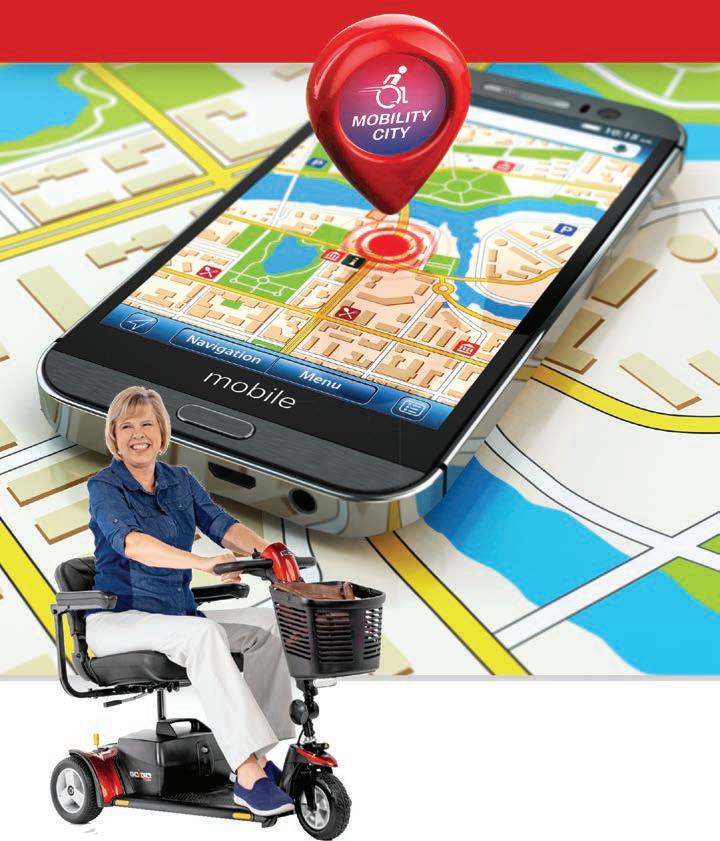


The Growing Economic Power of an Aging Population
By Falls Church News-Press
When people talk about seniors in today’s economy, the conversation too often slips into one word: burden. Politicians wring their hands over Social Security costs, families stress about long-term care, and headlines frame aging as a looming crisis. What’s missing from that picture is a hard look at the other side of the ledger. The economic engine that older adults quietly represent. In Falls Church, across Northern Virginia, and nationwide, seniors are not just recipients of support but powerful drivers of local economies, community stability, and even workforce resilience.
According to AARP, adults over 50 contribute more than $8 trillion annually to the U.S. economy. By 2030, that number is projected to climb to over $12 trillion. Closer to home, that translates to seniors who shop at Broad Street businesses, dine in local restaurants, and hire local contractors for everything from roof repairs to lawn care. Unlike younger households saddled
with student loans or unpredictable job markets, many seniors have stable pensions, retirement accounts, or paid-off homes. That purchasing power keeps small businesses afloat in cities like Falls Church.
Service providers see this most clearly. From home health aides to plumbers, landscapers to financial planners, seniors are steady customers. When older residents choose to age in place, they create an ongoing stream of work for contractors, cleaners, and caregivers. In a town where small businesses thrive on word of mouth, seniors often become the bedrock of repeat clientele.
While “retirement” is still the goal for many, an increasing number of older adults are staying in the workforce, either by choice or necessity. In Virginia, roughly 27 percent of people over 65 are still employed. That might mean a retiree serving part-time at a local café, a semiretired lawyer offering consulting services, or a teacher who returns to substitute in Falls Church classrooms. This trend
provides businesses with experienced workers in a tight labor market and helps address shortages in industries where reliability is in short supply. The stereotype of seniors withdrawing from economic life after 65 is badly outdated. Instead, they are redefining what “retirement” means and contributing valuable tax revenue along the way.
Perhaps the least recognized way seniors power local economies is through unpaid labor. Grandparents providing childcare save families thousands of dollars a year. A 2023 study estimated that if grandparents in the U.S. were paid for their childcare services, the economic value would exceed $50 billion annually. In Falls Church, where daycare waitlists stretch for months and costs rival college tuition, grandparents stepping in makes it possible for younger parents to stay in the workforce.
Then there’s volunteering. Seniors staff church food pantries, serve on city boards, and show up for civic events. At
the Mary Riley Styles Public Library, older volunteers help run programs and keep operations smooth. At Meridian High School games, retirees sell tickets and hand out programs. None of this shows up in GDP calculations, but without it, many community functions would grind to a halt.
Another overlooked dimension is how seniors sustain entire industries. From local pharmacies to physical therapy clinics, the demand for healthcare services linked to aging creates jobs and stabilizes sectors. In Falls Church alone, dozens of small practices including dental, vision, audiology, and more depend on steady streams of older patients. While this is often framed negatively as “rising costs,” it’s also an economic ecosystem that supports thousands of workers in Northern Virginia.
The language we use matters. If seniors are constantly described as “dependent,” it obscures the reality that they’re also creating demand, stabiliz -
ing neighborhoods, and passing on wealth. Every time an older resident pays property taxes on a long-held Falls Church home, that revenue supports schools, roads, and public safety. Every time they pick up the check at a family dinner on Broad Street, they’re transferring financial security down the line. The truth is, seniors are an economic multiplier. They may not be leading tech startups in Tysons Corner, but they are fueling the everyday economy that keeps communities livable.
With Falls Church’s senior population expected to grow over the next two decades, the question isn’t whether they’ll matter to the economy? It’s whether the city and region will recognize that value. That means designing policies and programs that support older adults not as dependents but as partners in growth. Expanding transportation options, making housing more age-friendly, and investing in lifelong learning opportunities are not just social services, they’re economic investments.




From Rocking Chairs to Power Players: Little City Aging
By Falls Church
The “golden years” used to sound like a postcard: quiet days, rocking chairs, grandkids on the weekends. But in 2025, the reality looks nothing like that. Seniors are living longer than any generation before them, spending in ways that shape the economy, and, more than ever, turning to technology and medical advances to keep their independence. Here in Falls Church, where the senior population is growing and civic leaders have made older residents a priority, this story is local as much as it is national. The apps they download, the programs they join, the trials they enroll in, and the policies City Hall protects are rewriting what it means to age in the “Little City.”
The numbers tell the truth — and they’re staggering. Baby boomers, born between 1946 and 1964, still control more than $78 trillion in wealth, over half of all U.S. household assets. That’s twice what Gen X holds and nearly ten times what millennials have managed to build. But it’s not evenly spread. Forty percent of people over 55 have no retirement savings at all. None. They rely on Social Security checks averaging about $1,900 a month. In Northern Virginia, where rent for a one-bedroom apart -
ment hovers around $2,000, that math doesn’t work. In Falls Church, seniors who bought their homes in the 1970s for $60,000 now sit on properties worth $1 million or more. It looks golden, but for many, the wealth is locked in bricks and mortar while cash flow runs dry.
At the same time, affluent retirees are fueling billion-dollar industries. Boomers make up half of all RV owners, dominate the cruise market, and drive the so-called “shoulder season” travel economy by filling planes in September and May when school is in session. The contradiction is stark: one neighbor booking a European river cruise, another quietly working part-time at the farmers market to pay for prescriptions. Technology is where seniors are quietly fighting back. Nearly three in ten Americans over 50 use a health app, but most stick to step counters or sleep logs. The real game-changers are apps that aren’t widely known. Pillboxie makes medication management visual and fool-proof — drag pills into morning, noon, or night slots and the phone reminds you when to take them. I-Care helps older adults with memory issues, connecting task lists to family members so nothing slips. Meditation apps like Ten Percent Happier deliver bite-sized lessons that ease stress and improve

sleep. Automatic reminiscence tools prompt conversations with photos and voice cues, helping those with cognitive decline stay connected. Yet nationally, only 9 percent of seniors use apps to track blood pressure, 8 percent for meditation, and 5 percent for mental health.
Those numbers hit harder when paired with another fact: in Virginia, “frequent mental distress” among adults 65 and older almost doubled in less than a decade, climbing from 5.7 percent in 2015 to 10 percent in 2023. Social isolation affects one in three seniors, and it doesn’t just make for lonely afternoons. The National Academies of Sciences says isolation increases the risk of heart disease by 29 percent, stroke by 32 percent, and dementia by up to 50%.
In a city like Falls Church — where neighbors see each other at the farmers market or City Hall — the solution is often connection. Apps help, but so do local programs that make sure no one disappears behind closed doors.
The medical breakthroughs unfolding right now are just as dramatic. Seniors already account for nearly 60 percent of all U.S. healthcare spending, and science is sprinting to keep up. At UVA Health, researchers are testing Tarlatamab, a drug that’s showing survival improvements for patients with small-cell lung cancer, one of the deadliest cancers known. The same institution is exploring whether HIV drugs (NRTIs) can prevent Alzheimer’s, and brand-new research on a brain molecule called STING suggests that memory loss itself might one day be preventable. These aren’t abstract studies happening overseas. They’re taking place two hours from Falls Church. Nationally, the National Institute on Aging lists over 400 Alzheimer’s and dementia trials active right now — from drug therapies to caregiver programs and diagnostic tools. Seniors here could participate, but too often they don’t even hear about these options until it’s too late.
That’s where Falls Church leadership has stepped in. Unlike many cities that treat older adults as an afterthought, the Little City has embraced its senior community. The Aging Services division provides case management, counseling, and access to affordable assisted living and dental programs. The Falls Church Senior Center is more than a social club — it’s a hub for fitness, art classes, and trips that keep people engaged and active. Fairfax County’s Virtual Center for Active Adults streams programming straight to tablets and laptops, making participation possible even for those with mobility challenges. Through ElderLink, a partnership with Inova, seniors can access chronic disease selfmanagement programs, fall-prevention services, and help navigating care.
The city’s commitment shows up everywhere. Budgets continue to prioritize Aging Services. Police and fire departments run safety checks for older residents. Zoning and development discussions now factor in senior housing and accessibility. Civic leaders defend funding for senior programming as part of what makes the Little City whole. And older residents themselves give back, powering nonprofits, volunteering in schools, and turning up in force on Election Day — Falls Church’s seniors vote at some of the highest rates in the community, shaping decisions that affect everyone.
So the question is less about whether the resources exist and more about whether seniors — and their families — know about them. Too many discover ElderLink after a fall, join the Senior Center after months of loneliness, or ask about clinical trials only after a diagnosis. That’s the old model: waiting for crisis. The new model is proactive — downloading the apps, signing up for the programs, asking the doctors about trials, getting connected before the problems hit.
And it’s not just about individual lives — Falls Church seniors are already steering the broader community. Older residents are among the most consistent volunteers in the city, logging thousands of hours with nonprofits, tutoring programs, and arts organizations. They’re the backbone of civic boards and neighborhood associations. And when elections come around, seniors in Falls Church turn out at rates younger voters don’t match. That civic weight has made City Hall listen, which is why aging services and accessibility aren’t just nice extras in the budget — they’re priorities. Seniors aren’t simply using technology and programs to adapt to their golden years; they’re using them to stay engaged, visible, and powerful in shaping the Little City’s future.
Seniors in Falls Church are among the best positioned in the country to thrive in this new model. This is an affluent, educated, resource-rich city with access to world-class healthcare and a government that has made older residents part of the blueprint for the future. The gap isn’t availability. The gap is awareness.
The golden years don’t have to be about decline. They can be about discovery — of new tools, new medical breakthroughs, new ways to stay connected to neighbors and family. Falls Church has already embraced its seniors. Now it’s time for every older resident to embrace the opportunities right in front of them. Because aging here doesn’t mean stepping aside. It means staying visible, staying connected, and yes, staying loud. And that’s the kind of future this city should be proud to lead.
News-Press
The End of Freedom: The Titans Who Own America’s Reality
Part 2 in a continuing Falls Church News-Press series on Technology in 2025 and the Future
by
Falls Church — We sing the national anthem at ballgames. We plaster “Land of the Free” on bumper stickers. We recite the First Amendment in classrooms as if the words alone can still protect us. But here is the brutal truth: America is not free. Not anymore. Not really.
Freedom wasn’t stolen in one moment. It was sold off piece by piece, click by click, dollar by dollar — until the very industries that once built this nation were twisted into machines of manipulation. The divide-andconquer strategies once used on battlefields became corporate business models. Rage was monetized. Division was packaged. Truth itself was put up for sale.
And then Donald Trump arrived. He didn’t invent the system — but he poured gasoline on it. Trained by Roy Cohn in the art of projection, Trump showed the Titans that truth no longer mattered, that hashtags could replace facts, that lies repeated loudly enough would reshape reality. He was the accelerant, the proof of concept, the final blow that confirmed democracy could be gamed and sold like everything else.
Even the CIA, once thought to be the all-seeing eye of national power, has been reduced to a pawn. Its servers run on Amazon Web Services. Its surveillance tools are powered by Palantir. Its risk models run through BlackRock’s Aladdin. The agencies that once watched the world are now dependent on the very Titans they should have been watching.
The History Channel’s “Titans of America” reminded us how Rockefeller, Carnegie, Morgan, and Vanderbilt once owned entire industries. They bent presidents to their will, bought off Congress, and crushed competition. But compared to today’s Titans, they look quaint. The oil barons and railroad kings controlled industries. The new Titans control reality itself, including speech, behavior, culture, money, war.
Mark Zuckerberg has neartotal control of Meta, wielding 54 percent of voting power despite holding less than 15 percent of its stock. He openly idolizes Augustus Caesar, the man who killed the Roman Republic. He secretly bought 1,300 acres in Hawaii and sued Native Hawaiian families to seize their ancestral land. His engineers admitted they could predict a relationship breakup with 90 percent accuracy three days before it happened. Internal memos revealed the company could tweak algorithms to shift national voter turnout by one percent. He buried research showing Instagram worsens depression and suicidal thoughts in teenagers. He tried to launch Libra, a private global currency that would have rivaled the U.S. dollar. Zuckerberg doesn’t just run a platform. He has built a surveillance empire that knows more about you than your family does.
Elon Musk, who legally crowned himself Tesla’s Technoking, has shown how fragile the system is when one man can swing global markets with a tweet. His Dogecoin memes drove the coin up 12,000 percent in weeks, creating and erasing billions of dollars. His company Neuralink killed dozens of monkeys in gruesome brain-chip experiments: one bled uncontrollably, another clawed at its own brain before dying. Musk has received more than $5 billion in taxpayer subsidies, even while posturing as a self-made genius. Meanwhile, he struck exclusive Pentagon deals that made SpaceX the default launch provider for the U.S. military, consolidating America’s access to space in his hands. Musk is not just a mememaker. He is a defense contractor, a market manipulator, and a man testing brain control on living beings.
Peter Thiel built Palantir with CIA seed money after 9/11. Its surveillance software, once used to track insurgents in Afghanistan and Iraq, now powers predictive policing in American cities and ICE’s deportation dragnet. He secretly
obtained New Zealand citizenship as an escape hatch. He has said publicly: “I no longer believe freedom and democracy are compatible.” He pays teenagers $100,000 to drop out of college, undermining higher education while grooming his own pipeline of loyal disciples. He bankrolled Clearview AI, the facial recognition company that scraped billions of faces from the internet without consent. He funds “Seasteading” floating cities designed as billionaire havens outside law. And in 2022, he poured $30 million into Trumpist candidates like J.D. Vance. Thiel doesn’t just doubt democracy. He is actively investing in its replacement.
Larry Ellison, founder of Oracle, owns 98 percent of the Hawaiian island of Lanai, where he is building a “smart island” that tracks residents’ energy, water, and even health data. After 9/11, he lobbied Congress for a national ID system — with Oracle as the vendor. Today he is circling both TikTok and Disney, meaning one man could control both the social feeds that dominate youth attention and the cultural stories that define American childhood. Ellison is not just a businessman. He is a would-be cultural monarch.
Jeff Bezos embedded Amazon at the very core of government surveillance. Amazon Web Services holds a $600 million CIA contract and powers the Pentagon and NSA. Amazon patented wristbands that buzz warehouse workers when their hands move “incorrectly.” The company built “union heat maps” to predict which warehouses were most likely to organize, then spied on workers’ private Facebook groups. Bezos is building a 10,000-year clock in a Texas mountain as a monument to permanence while quietly buying hundreds of thousands of acres of land. His space company Blue Origin imagines orbital colonies where corporations, not nations, own humanity’s future. And while running the backbone of U.S. intelligence computing, Bezos owns The Washington Post . He controls both the servers of the
spies and the stories the public reads.
Then there is BlackRock, the trillion-dollar shadow government. With nearly $10 trillion in assets under management, BlackRock is larger than the GDP of Japan and Germany combined. Its Aladdin super-AI tracks more than 20,000 risk factors across the global economy every day. It has direct data pipelines with the Federal Reserve. During Covid, Trump’s Treasury outsourced U.S. bondbuying to BlackRock, literally privatizing America’s central bank. BlackRock owns stock in both defense contractors and the media companies that cover their wars, profiting from the bombs and the headlines. Internal documents advised clients to buy water rights as a future asset, planning to profit from global thirst. BlackRock doesn’t just move markets. It dictates them.
And behind the curtain are the defense contractors who perfected this game decades ago. Lockheed Martin’s F-35 program is the most expensive weapons system in history, projected to cost $1.7 trillion over its lifetime, and with factories in 45 states, it is politically untouchable. Northrop Grumman oversees America’s nuclear modernization while funding PR campaigns that tie local jobs to nuclear weapons, making nukes a source of civic pride. These companies don’t just build weapons. They build dependency. They make it impossible for Washington to ever stop paying them.
Donald Trump sits at the political center of this machinery. Mentored by Roy Cohn, McCarthy’s ruthless lawyer, he mastered the rules: never admit, always attack, accuse others of what you are guilty of. Trump turned those rules into hashtags. #FakeNews to delegitimize journalism. #DrainTheSwamp to disguise his own actions. #StopTheSteal to cover his attempt to overturn the election. His allies’ Project 2025 is the Cohn doctrine turned into government policy: purge 50,000 civil servants, politicize data,
weaponize the DOJ, and fuse billionaire monopoly with the state itself.
Here in Virginia, Senator Mark Warner has been one of the only voices connecting the dots. The first in his family to graduate college, Warner built his fortune in telecom spectrum and helped launch Nextel. As governor, he expanded broadband into rural Virginia. As chair of the Senate Intelligence Committee, he has seen firsthand how platforms are used to manipulate public opinion and national security. He pressed Meta to release internal research on Instagram’s impact on teens. He warned that TikTok is a national security threat. He co-sponsored the Honest Ads Act, the first attempt to regulate online political advertising, which Big Tech spent millions to kill. In classified hearings, Warner has warned that foreign powers are using U.S. platforms to “map the American mind in real time.” He has said bluntly that Project 2025 is a direct plan to dismantle democracy. He is one of the only leaders who understands both the code and the consequences, and that makes him dangerous to the Titans.
So why do we keep teaching history if we refuse to learn from it? Why do we keep teaching science if its data can be twisted into propaganda? Why do we teach math if algorithms are designed not to solve problems but to weaponize fear? The old Titans built railroads and oil fields. The new Titans build mental prisons.
The terrifying truth is that democracy did not end with tanks in the streets. It ended with hashtags, algorithms, and billionaires who turned freedom into a product. America is not free. We are datasets. We are monitored, modeled, and managed. We are citizens only in name, commodities in reality. Unless we wake up, history will not remember us as defenders of liberty. It will remember us as the generation that gave it all away while still singing that we were free.
Nick Gatz Falls Church News-Press
PICTURES FROM AROUND F.C.



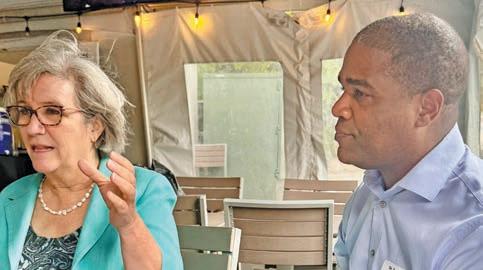





LIVE MUSIC wafted throughout the Little City last weekend, including from this group performing outdoors at Clare and Don’s restaurant. (Photo: FCNP)
FALLS CHURCH MAYOR Letty Hardi (at podium) delivered strong remarks to the F.C. Democratic Committee potluck in the F.C. Community Center last Sunday. At left is committee chair Jeff Person. (Photo: FCNP)
U.S. REP. DON BEYER was the keynote speaker at Sunday’s F.C. Democratic Committee potluck. (Photo: FCNP)
NEW FALLS CHURCH School Superintendent Dr. Terry Dade (right) attended the monthly luncheon of the Falls Church Chamber of Commerce last week, with F.C. Council member Marybeth Connelly (left). (Photo: FCNP)
COMMUNITY MEMBERS GATHERED for Falls Church’s Vietnamese Heritage Day at Cherry Hill Park, celebrating culture, food, music, and traditions with families and friends. (Photos: Gary Mester)
SYLVIA MALM (right) was named winner of the annual Marian Driver Award for grass roots activism at Sunday’s Democratic Committee potluck. Revenue Commissioner Tom Clinton (left) made the announcement. (Photo: FCNP)
CHATTING WITH members of the Meridian High School Democratic Club at the F.C. Dem potluck Sunday was F.C. Mayor Letty Hardi. (Photo: Phil Duncan)
News & Notes
‘Turning of the Screw’ Opens At Cauldron Next Week
“Turning of the Screw,” an original musical by the Falls Church-based duo of Steven Gregory Smith and Matt Conner, is being offered at the F.C.-based Creative Cauldron theater starting Oct. 2 through Oct. 26. It is adapted from the ghost story written by Henry James.
The music is by Conner and the libretto and lyrics by Smith. It received its world premiere at Creative Cauldron in 2015, as part of the “Bold New Works for Intimate Stages” initiative and was hailed by critics as “hypnotic and unnerving.” The story follows a governess who takes a position caring for two children on a remote country estate. She soon has eerie encounters.
Told through the musical genius of Conner and Smith, Creative Cauldron’s revival of this chilling psychological thriller will keep audiences on the edge of their seats, a press release notes.
Tinner Hill Hosts Workshop On Policing Activities in F.C.
A workshop of Policing Activities in the City of Falls Church will be held this Saturday, Sept. 27, hosted by the Tinner Hill Foundation at 1 p.m. at the Falls Church Presbyterian Church Fellowship Hall, 225 E. Broad in Falls Church.
In this free workshop, Officer Ricardo Feliciano will provide an introductory presentation of the City of Falls Church Police Department with a Q and A session. Topics may range from transparency of police practices, DEI training, community engagement, and more.
Beyer’s Women’s Conference Set Oct. 6 at Mason Square
U.S. Rep. Don Beyer of Northern Virginia will host his Ninth Annual Women’s Conference: The Ripple Effects of Resilience on Monday, October 6 at George Mason University’s new Fuse building at Mason Square in Arlington. This event is free to the public but capacity is limited, so attendees are encouraged to register in advance.
This year’s event will bring together women leaders to share stories of perseverance, strength, and resilience in the face of the challenges confronting our country and community in these unprecedented times.
The discussion will feature Brooke Sydnor Curran, founder of Move2Learn; Lisa Jacobs, Executive Director of the Alexandria Tutoring Consortium; and Elizabeth Jones Valderrama, Executive Director of Offender Aid and Restoration (OAR). The discussion will be moderated by Nyree Wright, Executive Vice President of Crisis & Risk Communications at Edelman. Rep. Beyer will also present this year’s Clara Mortenson Beyer Women and Children First Award.
Mason University Named No. 1 In Virginia for Social Mobility
George Mason University stands out as Virginia’s No. 1 public university for social mobility in U.S. News & World Report’s Best Colleges 2026, as Washington Monthly’s “Best Bang for the Buck” in the Southeast, and as a top 50 public university nationally according to Forbes magazine.
As the only public doctoral university in the state – and one of just five very large public universities in the nation – George Mason has been designated by the Carnegie Foundation and American Council on Education (ACE) in the highest tier of Opportunity Colleges and Universities for its combination of higher access, higher earnings and being a top research university. This distinction reflects George Mason’s preparation of more students to build grand solutions for a brighter future.
“These latest rankings and accolades help spotlight the opportunities, excellence, research capacity, value, and successful student outcomes at George Mason,” said George Mason President Gregory Washington. “The university achieves all this at scale like few other universities in the country, and we transform more lives than any public university in the Commonwealth of Virginia. These rankings are impressive –our graduate success stories are even more so.”
GMU Celebrates Formal Naming of Fuse Today
George Mason will mark a defining moment on today, Sept. 25, with the grand celebration of Fuse at Mason Square, featuring the formal naming of the School of Computing in honor of philanthropists Kimmy Duong and Long Nguyen, the ribbon cutting of the new Energy Exploration (E2) Center, and interactive exhibits as part of George Mason’s Grand Challenge Initiative.
Located in Arlington, Fuse is designed as a catalyst for collaboration between academia, industry, and government. The grand celebration will demonstrate how George Mason and its partners are advancing research, talent, and business to strengthen the region and addressing today’s grand challenge to drive solutions worldwide. Built in partnership with Mason Innovation Partners (MIP), a development consortium led by Edgemoor Infrastructure and Real Estate, Fuse stands as a model of how universities and private partners can work together to expand opportunity and accelerate innovation.
Plein Air Art Competition Concludes Saturday
Artists that have been painting outdoors around the City of Falls Church during September conclude their efforts with a Quick Draw event this Saturday, Sept. 27, with three hours that are free and open to the public from 9 a.m, to noon.
Citizens will be invited to vote on a “People’s Choice” award, and the event’s juror is Ted Reed. Participating artists will submit their competition works by 9 a.m. and the Quick Draw competition will be held from 8 a.m. to 11 a.m. open to all ages. Quick Draw competitors can register for $15 at a table at the Falls Church City Hall grounds event site, 300 Park Avenue, that morning.
Winners of both competitions will be announced at noon.
‘How to Market Your Art’ Seminar This Friday
Jennifer Kahn Barlow will lead a business workshop at the Falls Church Arts Gallery this Friday, Sept. 26, at 12:30 p.m. for emerging adult artists.
The workshop will cover areas like finding your niche, file organization, financials, important template documents, building a digital presence, and more. The lessons are tailored specifically for visual artists and include plenty of practical tips and real-life examples. Entry fee is $65.
Barlow is a seasoned artist with over 15 years in the Washington, DC, arts scene, known for her vibrant and whimsical paintings of sweets. She has been represented by numerous galleries, shown her work in venues across the mid-Atlantic and been featured in publications such as Professional Artist Magazine and The Washington Post.
New Book ‘Empowers Kids Against Hurtful Labels’
In “These ABCs Belong To Me!,” author Alicia McKenzie, with illustrations by Sarah DeMonteverde, draws on her 18 years of parenting five children who are wildly different from each other, as well as her own real-life experiences as a biracial child with boundless energy and an opinionated streak, to create fresh, uplifting takes on 26 all-too-familiar critical and belittling words spanning the alphabet.
From “ambitious” to “messy,” from “timid” to “zany,” kids will discover how to reclaim the words that are commonly used as hurtful labels and transform them into confidence-boosting qualities that make them unique and are worth celebrating.
“As a child who watched my military dad suffer from severe PTSD, and taking a lot of his frustration out on my brother—this book is really about understanding that parents must take a breath and realize that every child has special qualities and is not always cut from the same cloth,” McKenzie assures parents. “Someone might use a word meant to limit or define your child, but it’s up to us as parents to teach them how to flip that script—turn a negative into something positive so that you and your child have the power to create their extraordinary narrative.”















This Week Around Falls Church
Thurs, Sept. 25
Candidate Forum Falls Church City Council Candidates
7 p.m., American Legion Hall, 400 N. Oak St.
Falls Church Fiber Artists
10:00 a.m.–12:00 p.m., Mary Riley Styles Public Library (Upper Level Conf. Rm).
Playtime with the Early Literacy Center
11:00 a.m.–12:00 p.m., MRSPL (Lower Level Conf. Rm). Drop-in.
A Grand Celebration of Innovation, Research, and Collaboration
5:00–7:00 p.m., Fuse at Mason Square, 3351 Fairfax Dr., Arlington. Hosted by GMU President Gregory Washington.
Fri, Sept. 26
All Aboard!
(Train toys playtime, ages 2–4) 2:00–4:00 p.m., MRSPL (Lower Level Conf. Rm).
Wine & Cheese Tasting & Community Initiatives
6:00–8:00 p.m., Idylwood Presbyterian Church, 7617 Idylwood Rd.
Meridian Football: HOME vs. Fauquier (Homecoming)
7:00 p.m., Meridian HS, 121 Mustang Alley.
The Stranger (Billy Joel tribute) — Evening, The State Theatre. (Check venue for exact door/show times.)
Sat, Sept. 27
Falls Church Farmers Market
8:00 a.m.–12:00 p.m., City Hall Parking Lot, 300 Park Ave.
Plein Air Festival & Quick Draw Event
9:00 a.m.–12:00 p.m., Falls Church City Hall Grounds, 300 Park Ave. Free and open to the public. Plein Air judging
(8–9 a.m. check-in, winners announced at noon). Quick Draw Competition (8–11 a.m.), open to all ages/levels, $15 entry fee. People’s Choice Award voting. Juror: Ted Reed.
Neighborhood Fall Festival
11:00 a.m.–2:00 p.m., The Kensington Falls Church. Live music, games, petting zoo, bites from Executive Chef Daniel Powers. Free, open to all.
Workshop: Policing Activities in the City of Falls Church
1:00–3:00 p.m., Falls Church Presbyterian Church Fellowship Hall, 225 E. Broad St. FREE workshop hosted by Tinner Hill Foundation. Officer Ricardo Feliciano presents on local police practices, transparency, DEI training, and community engagement. Includes Q&A. Parking available on three sides of the church.
Washington Sinfonietta (Falls Church Episcopal Concert Series)
7:30 p.m., The Falls Church Episcopal, 166 E. Broad St. Program: Haydn Symphony No. 90; Mozart Symphony No. 41 “Jupiter.” Tickets: Adults $20 / Students & Seniors $15 / Youth under 18 free.
The Nashville Nights Band: Ultimate ’90s Country
Doors 7:00 p.m., Show 8:30 p.m., The State Theatre.
Sunday, Sept. 28
Mickey’s Music Spectacular! (FCCPS Choral Boosters)
2:00 p.m., Meridian High School Auditorium. Kids’ costumes encouraged; favorite songs; fun activities after.
LAST DAY: Falls Church Arts “Layers” Exhibit — Falls Church Arts gallery.
Monday, Sept. 29
Fall Storytime 10:30–11:00 a.m., MRSPL (Lower Level Conf. Rm).
Playtime with the Early Literacy Center 11:00 a.m.–12:00 p.m., MRSPL (Lower Level Conf. Rm).


Artist Ananda Rice and 40 other artists have been painting Scenes in the City for the annual Plein Air Art Festival concluding Saturday September 27 at City Hall for public viewing. (Photo: Keith Thurston)
Hilary Schenker of Tokoma Park is one of 50 artists in Falls Church painting for the Plein Air Arts Festival displaying Saturday, September 27 at the City Hall grounds. (Photo: Keith Thurston)
Meridian Field Hockey Streak Rolls, Cross Country Shines at Home
By Ryan McCafferty
Another week has gone by at Meridian High School, with a full month now in the books on the fall sports season. With October right around the corner, let’s take a look at how the Mustangs did.
Last week:
The football team was on the road in Winchester last Friday to face Millbrook and lost 35-21. This was a contest that could have gone either way, and the Mustangs showed impressive resilience despite a few bad breaks. They drop to 2-2 on the year.
Field hockey had another successful slate, beating Fauquier 1-0 on the road in an overtime thriller last Tuesday night and then winning four games in two days over the weekend in tournament play. They beat Broad Run 4-1, Thomas Jefferson 6-0, Jackson Reed 9-0, and host team Justice 4-0, extending their winning streak to nine games ever since their seasonopening loss.
Girls’ volleyball saw mixed results during a busy stretch.
The Mustangs beat Hayfield and Manassas Park at home early last week, each in three sets, before falling in five on the road to Kettle Run on Thursday. Over the weekend, they took one of three in tournament play, beating Robinson but losing to Centreville twice. They
now sit at 7-5.
Meanwhile, the boys picked up their first win of the year on the road at Mount Vernon, doing so in a three-set sweep. It was sandwiched between two losses at Potomac and Maggie Walker, bringing them to 1-11.
Cross country hosted its annual home District meet last Tuesday at Mason District Park, and despite competing in less than ideal weather, the Mustangs had an impressive outing. The girls earned the team victory, led by Michelle Malheiro placing third individually, while the boys finished second to Warren
County with William Anderson taking the individual win.
Golf came in 5th in their event last week.
This week:
The football team returns home Friday to host Fauquier on Homecoming night.
Field hockey will travel to Kettle Run Tonight for their lone matchup of the week.
Girls’ volleyball gets some much-needed rest until hosting Justice on Monday.
Cross country will head to the Oatlands Invitational on Saturday.

In Memoriam: Anne K. King
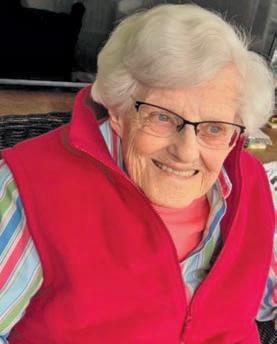
Private Burial Ceremony at the grave- side at 11 a.m. on Tuesday, September. 30, 2025, at the Oakwood Cemetery, 401 N. Roosevelt Street, Falls Church, VA 22044.
Anne K. King, of Falls Church, Virginia, passed away peacefully on September 12, 2025, at the age of 99. Born on
December 18, 1925, in Ayden, North Carolina, to Wilbur and Sally (Carman) Kittrell, Anne grew up with a spirit of curiosity and kindness that she carried throughout her life.
She was predeceased by her parents, her sister Robin, and her beloved husband of more than fifty years, Thomas J. King, Jr. Anne retired from a distinguished career with the Federal Aviation Administration, where her steadfast work ethic and warm demeanor left a lasting impression on her colleagues
A woman of boundless creativity and energy, Anne found joy in painting, bridge, sewing, crafts, and gardening. Her love of learning and sharing her talents made her an engaging neighbor, a fun-loving friend, and an inspiration to those around her. Anne’s caring nature and sense of humor
endeared her to all who knew her.
Anne was a longstanding supporter of the Falls Church Lions Club and participated in numerous volunteer organiza tions, enriching the lives of countless others with her gen erosity and compassion.
Anne is survived by her niece, Judy Kubicek of California. She leaves behind cherished mem ories and a lasting influence on Kathy Lopresti, a neighbor whom Anne helped raise, and with many close friends and neighbors who will miss her dearly.
Anne’s legacy of kindness, creativity, and community spir it will continue to inspire all who had the privilege of know ing her.
In lieu of flowers, please send donation to a local home less shelter or animal shelter.


MERIDIAN HANGS TOUGH in road loss. (Photo: FCCPS /Mei Fitzpatrick)
Our Man In Arlington
Bill Fogarty
Where were you on the morning of September 11, 2001? The answer obviously depends on the year you were born. Most of you reading this column likely have very clear memories of that day. Around 9:30 that morning I was on the 13th floor of a building in the Courthouse area, sitting with my colleagues in the one office with a television, watching reports from New York City, when suddenly we were astonished to see smoke coming from the Pentagon.
Each month I write a Front-Page History column, capturing the context of what an “ordinary day” might have looked like for those living in Arlington at any particular time. These columns have reflected life in the 20th century, but in this month of September, I want to cover more recent history.
For this look-back to September 11, 2001, I reviewed the news before terror struck. What did our day look like while eating breakfast, reading the Washington Post ? The front-page news of the Post had an ordinary feel to it.
The weather was listed as “Sunny, Pleasant.” The top headlines were about public health and environmental issues: “Broad Stem Cell Research Backed,” and “EPA to Urge Tighter Rules for Arsenic.” There was an article about the Virginia governor’s race, pitting Mark Warner against Republican Mark Earley (Virginia’s Attorney General). The “mounting budget shortfall” attributed to current Governor James Gilmore was the main topic of the day.
Another front-page headline had a theme familiar to us today: ”Poll Finds Public Wary of Tax Cut.” A fourth frontpage story explored the trend of employees looking “beyond borders” for workers, with a headline as follows: “Use of Temporary Visa Programs Booming.”
In local news, there was an article about plans by the federal government to expand the Arlington National Cemetery. A coalition of groups opposed the expansion, including the Sierra Club, the NAACP, the National Park Service, and the Arlington County Board. Land to be
taken included old-growth forested areas, and land that had been inhabited by Freedman’s Village after the Civil War. A 1975 federal agreement had given the land to the National Park Service in perpetuity. County Board chair Jay Fisette had a memorable quote in the article: “What does ‘in perpetuity’ mean?”
Other local news that week involved the release of the County budget report for Fiscal Year 2002, with topics that included affordable housing initiatives, and support for social services. There were a number of stories with concerns about the spread of the West Nile virus.
I discovered that the Post published a Special Late Edition that evening, which is fascinating “immediate history”. One of the headlines captured a familiar analogy: “This Is On The Scale of Pearl Harbor.” The articles had common themes of confusion and fear and anger. One story quoted a Crystal City resident, Johnny Cervantes, who worked for the IRS. His boss told the staff to go home after the report of the crash into the Pentagon. Cervantes said, “I think, like everyone else, I’m shocked. I’m walking home to Crystal City because I don’t want to take the subway.”
Much has been written about the tragedy of September 11, and the many stories of heroism and resilience. Among the available resources, I recommend the “After-Action Report on the Response to the September 11 Terrorist Attack,” which can be found on the County website. It is both somber and inspiring. It is an important document to help us keep that day in our collective historical memory.
Each year there are a number of ways that the community marks the day. This year the opportunities included a touching ceremony held at the County government center. Other people may have visited the memorial site at the Pentagon, or participated in the 9/11 National Day of Service. A year-round opportunity recommended by a friend is to support organizations dedicated to victims and first responders. All of these acts honor the memory of those lost, while fostering community resilience.
For those of us with clear memories of that day, a simple act of remembrance might be to share your memory with the younger generations.


Every four years, Virginia finds itself at the center of American politics. Only Virginia and New Jersey will elect a governor in 2025, and because Virginia is the more competitive state, we are seen as a national bellwether. Once again, our Commonwealth is in the spotlight because of what we will decide this November – and what it tells us about what’s going on in Washington.
In some years, the connection between state and national politics may not be that deep. But with Trump ordering the National Guard into the streets of D.C., thousands upon thousands of federal workers in Virginia out of work, and a Republican slate of candidates expressing full fealty to Trump, electing Democrats is the only way to protect Virginia from the chaos of Trump’s second term.
Democrats are offering a ticket that reflects both Virginia’s strength and its promise, offering experience, leadership, and an unwavering commitment to protecting our rights at a time when they have never been more at risk.
Abigail Spanberger has spent her career serving the American people, from law enforcement to Congress. She has lowered prescription drug costs, defended democracy from extremists, and worked across the aisle without compromising her values. As Governor, she will safeguard and strengthen our public schools, and tackle the rising cost of living that strains families across Virginia.
Ghazala Hashmi worked for thirty years teaching English literature, and broke barriers as the first Muslim and first Indian-American woman elected to Virginia’s Senate. She has championed contraception rights, defended public schools, and fought to ensure every community has a place in shaping our

Commonwealth’s future
And former Delegate Jay Jones is running for Attorney General at a moment when that office could not be more critical. State attorneys general are the last line of defense against rollbacks on federal funding, civil rights, and voting access. Our Attorney General should be standing up for the many thousands of federal workers who have been illegally fired, and speaking out against Trump’s politicization of the Department of Justice. Jones will not hesitate to stand up to Trump when he threatens our communities, nor will he shy away from holding powerful interests accountable.
In recent years, we have seen reproductive rights stripped away, voting rights chipped at, and environmental protections weakened. We’ve seen immigrants and LGBTQ+ Americans targeted, and the trust we place in our democracy has been tested. Virginia must be a firewall against these forces.
This election is not just about politics, it’s about values. Do we believe Virginians should have the freedom to make their own healthcare decisions? Do we want our children to attend strong public schools? Do we want a fair economy where workers, families, and small businesses thrive, not just the wealthy and well-connected? Do we want leaders who defend democracy from those who would undermine it?
Abigail Spanberger, Ghazala Hashmi, and Jay Jones answer those questions with a resounding yes. Together, they represent a vision of a Commonwealth that protects freedom, invests in opportunity, and stands up against tyranny.
On November 4th, the eyes of the country will be on us. Let us send a message about who we are, and the future we choose.
